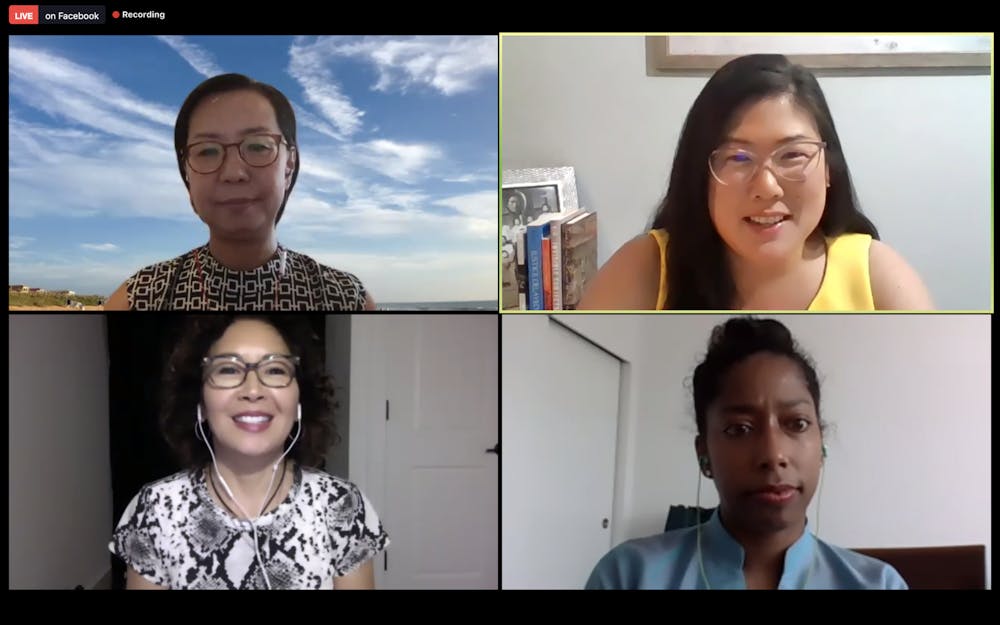Lee, who is from a small town in western North Carolina, also spoke about her own experiences of learning about issues of racism and privilege while at UNC in the 1980s. She recalled witnessing students building shantytowns in protest of South African apartheid in front of South Building and the difficulties faced by Black students and activists in establishing the Sonja Haynes Stone Center for Black Culture and History.
She said having a dedicated space on campus is crucial for Asian Americans on campus, and working to support other underrepresented groups is equally significant. The term “ally" is important to be cognizant of, she said.
“For me to say that I am an Asian American ally to the Black Lives Matter movement is not for me to say — my actions and my behavior, and my contribution and my commitment, I hope would allow people in the Black Lives Matter movement to say, ‘Barb Lee is an ally,’” she said. “It is not a word that I use for myself.”
Preeyanka Rao, co-director of fundraising and development for the campaign, said kicking off the AAC’s programming with a discussion of anti-racism was important.
“A lot of Asian American civil rights we got because of the leadership of Black African Americans during the Civil Rights Movement,” she said. “But it is still important to note, we have to acknowledge, that there is still anti-Blackness within the Asian American community and that the only way that we're going to see growth and change, and a stronger relationship between the two minority groups, is to have a really constructive conversation and discussion.”
Robinson said one way students can engage in anti-racism learning on campus is through taking classes offered in the African, African American and diaspora studies, women's and gender studies, American studies and Asian and Middle Eastern studies departments at UNC.
“That is where the faculty who are trying to do that work are located, and a lot of folks don't realize that's where they can learn some of the history that they're not hearing anywhere else,” she said.
25 years in the making
For years, Asian American students have pushed for a dedicated space on campus. Rao said the center has been almost 25 years in the making.
In January, UNC’s Board of Trustees approved the Asian American Center. It was later established in the provost’s office as a center in July.
Heidi Kim, AAC director and a professor in the English and comparative literature department, credits the work of the alumni- and student-led campaign in finally establishing the center.
“Historically, ever since there's been an Asian America, student activism has always been the central driving force,” she said. “... I think it has just obviously really driven this process forward at a speed that nobody could ever have imagined.”
To get the day's news and headlines in your inbox each morning, sign up for our email newsletters.
The kickoff event was co-sponsored by a number of UNC organizations, including the Stone Center. Joseph Jordan, the Stone Center’s director, said student activism drives forward critical discourse and makes the University stronger.
“In its best days, (student activism) has created some of the most important things that you see in university life," Jordan said.
Going forward
Rao said while the team would have loved to hold an in-person celebration and opening of the center in a non-COVID-19 world, the virtual format of last week’s kickoff also provided an opportunity to engage with people beyond those who regularly interact with the University.
Looking forward, Rao said fundraising will continue to be important for the campaign. The center raised more than $72,000 during GiveUNC, the University’s annual giving day. Currently, the center’s goal is to raise $1.2 million by the end of this year to support its operations and endowment. Over the next five years, she said the goal is to raise $5 million to fully endow the AAC.
Rao said she hopes the center will one day have permanent staff. Currently, the AAC’s goals include expanding professional development opportunities, scholarships and funding for student-driven initiatives, hosting cultural events, academic speakers, workshops and promoting a robust alumni network.
Kim said though the AAC doesn’t have a physical space on campus, the search — which has been complicated by the pandemic — is ongoing. Still, she’s not letting the pandemic slow down plans for future events and virtual programming.
“It is definitely time for the center,” Kim said. “And I am certainly going to do all I can to meet that pent-up demand.”
Similarly, Johnson said having the institutional support from UNC for a dedicated space for Asian Americans on campus is a unique and long-awaited kind of recognition. He said that in the coming years, he hopes the support of the AAC will allow other students to assert more truth to their identities, as he was able to.
“That (the center) is the first of its kind is wild, but then just looking forward past that, how this is going to be here until as long as the University stands,” he said. “It's really hard to get a scope of the history we're making, because we're right at this moment or right at the inception, but I'm really looking forward to how this can develop.”
@MaydhaDevarajan
university@dailytarheel.com



